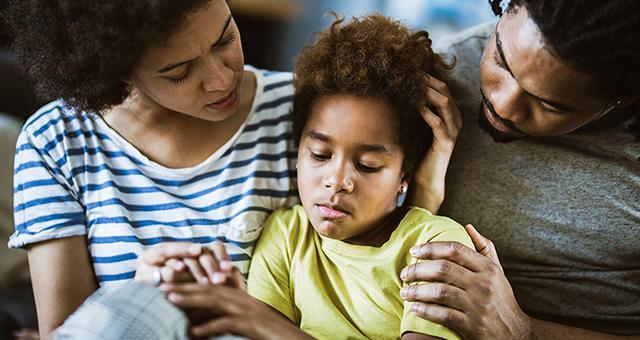
We want all children to grow up without fear, but know that even while they are still very young, children will experience stressful and traumatic situations. Events in the news can cause children who are aware of them anxiety or fear. It is comforting and empowering to know that there are skills children can learn to help them cope. And there are experts who can help us teach them. These experts can support us helping children cope with tragic events.
The books and resources listed below are designed by early childhood experts to help you talk through fear and anxiety with your child. It is clear from the resources we have gathered that one of the best things we can all do is simply reassure children that many people – their family, their teachers, their neighbors, the people at daycare or church, or the library, love and care about them and are looking out for their safety.
Favorite stories can also be steadfast old friends to count on in times of trouble. Open a book. Start to read. Hold them close and revisit old friends together; Curious George, Arthur, The Little Engine That Could. Find the books in the bookcase with the dog-eared pages and the tell-tale bite marks on the spine; the ones you can probably recite without looking at the pages. Choose the one with the coffee ring on the cover for having been on the bedside table every night. Take advantage of the comfort and security that time spent with you and a good book can provide.
Helping Children Cope with Tragic Events: Professional Advice
- NPR: How to talk to children about the violence in Israel and Gaza
- National Education Association: Talking to Students About the Texas Elementary School Shooting
- Colorín Colorado: 15 Tips for Talking with Children About Violence (This page has been updated with information specific to the shootings in both Uvalde, Texas and Buffalo, New York. Colorín Colorado offers bilingual, research-based information, activities, and advice for educators and families.)
- PBS Kids for Parents: Helping Children with Tragic Events in the News
- Colorín Colorado: Talking About Racism and Violence: Resources for Educators and Families
- EmbraceRace: Nurturing Resilience in a World of Racial Aggression and Violence
- KidsHealth: How to Talk to Your Child About the News
- Greater Good Science Center: How to Talk With Kids About Scary News
- Peace Learning Center: Ukraine Guidance This is an informative, printable .pdf with many helpful resources.
- American Academy of Pediatrics: How to Talk With Your Child About the War in Ukraine Dr. David Schonfeld offers his thoughts including a helpful FAQ of commonly asked questions from kids with ideas for how to answer them.
Helping Children Cope with Tragic Events: Sesame Street Traumatic Experiences Guide
The experts at Sesame Street have put together an online coping guide called Traumatic Experiences to help adults explain community violence to young children. The guide includes a variety of helpful videos that show familiar Muppet characters modeling various coping strategies. The guide also provides practical ideas for helping children cope with tragic events. Related tools include storybooks, activities, and printables.
Violence in Communities
Violence in Communities (también disponible en español: Violencia En La Comunidad) In this video, Rosita comes to Allan upset after hearing that somebody hurt a lot of people. Allan’s skilled responses are shared in the printable guide Troubling Times that provides helpful advice for answering some of the most challenging questions children ask. What happened? Why did these people do bad things? Will the bad people come to hurt us? Will this happen again?
Stand Tall Together
Stand Tall Together (también disponible en español: Con la cabeza erguida) In this video Big Bird learns how movement can help focus a person’s mind when it is overwhelmed with big feelings. Big Bird learns the tree pose to help himself feel steady and confident. You can follow along with the video and use this tree pose printable to model this self-calming technique.
Super Grover’s Super Pose
Super Grover’s Super Pose (también disponible en español: La pose de poder de Súper Grover) In this video Super Grover shows how holding his body in a confident manner and saying encouraging things to himself can help ease his worry and anxiety. Even Super Grover doesn’t always feel super, but doing these self-care techniques helps him remind himself, “I am super!”
Big Bird’s Comfy Cozy Nest
Big Bird’s Comfy Cozy Nest In this video Big Bird is feeling lots of things all mixed together and he doesn’t know what to do with them. He feels sad, angry, confused, and anxious. Big Bird learns a self-calming technique imagining a safe place in which he can feel calm and peaceful. Big Bird’s Nest includes helpful conversation prompts and Let’s Play Activity Book offers several ideas to help children explore their emotions as well as a storybook version of “Imagine a Safe Place with Big Bird” in both English and Spanish.
Count, Breath, Relax
Count, Breath, Relax Learn a simple self-calming technique with the Count and Cookie Monster by slowly blowing out pretend birthday cake candles.
Care, Copy & Connect
Care, Cope & Connect is a printable online guide to help adults comfort and support kids going through community stress. It includes ideas to help kids feel safe and secure, activity pages, and self-care tips for parents and caregivers. It is available in Korean and Arabic.
Books
When children are afraid, it is common for them to fear being separated from their trusted adults. Three stories that are particularly good for talking about coping with separation anxiety are Owl Babies. Llama Llama Misses Mama, and The Kissing Hand. Just click on one of the book covers to watch the story in a video read aloud. I Am Peace a Book of Mindfulness and Bee Calm the Buzz on Yoga also might be helpful for practicing self-calming techniques.
More Books You Can Check Out to Help Children Cope
When young children are feeling scared, it can be helpful to read a book together that helps talk with them about their anxious feelings; or helps answer questions about difficult topics like violence or tragic events children hear about on the news. Below are several sensitive and insightful children’s stories that address separation fear, anxiety, and grief. These stories can help children learn to recognize and name these emotions, they can offer reassurance, and they can provide ideas for helping children (and you) cope.
Need more help? Ask a Library staff member at any of our locations or call, text or email Ask-a-Librarian. Additionally, the Tinker Station helpline at (317) 275-4500 is also available. It is staffed by device experts who can answer questions about how to read, watch and listen on a PC, tablet or phone.

